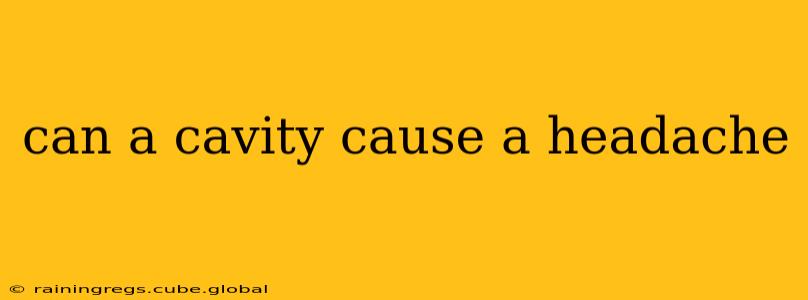Yes, a cavity can indeed cause a headache, although it's not the most common cause. The connection lies in the intricate network of nerves and tissues in your head and face. A severe toothache, often stemming from an untreated cavity, can trigger referred pain, radiating to other areas, including your head. Let's delve deeper into this connection and explore related questions.
How Does a Cavity Lead to a Headache?
The pain from a cavity isn't directly transmitted to your head. Instead, the intense pain signals originating from the infected tooth travel along the same nerve pathways that serve your head and face. This shared neural pathway is why a toothache can manifest as a headache, particularly in the temporal area (sides of the head) or even behind the eyes. The inflammation and pressure within the infected tooth can intensify these signals, leading to a throbbing, persistent headache.
What Kind of Headache Does a Cavity Cause?
The headache associated with a cavity is often described as:
- Sharp and throbbing: The pain isn't a dull ache but rather a sharp, intense throbbing sensation that often intensifies with chewing or biting.
- Localized: The headache is often focused on one side of the head, corresponding to the location of the affected tooth.
- Worse at night: The pain may be more pronounced at night when you're lying down, increasing pressure on the affected tooth.
- Accompanied by other symptoms: Besides the headache, you might experience facial tenderness, swelling, or sensitivity to hot or cold temperatures.
It's crucial to distinguish this type of headache from other headache types, such as migraines or tension headaches. While they share some similarities in location, the presence of a toothache—and other oral symptoms—is key to differentiating them.
Can a Small Cavity Cause a Headache?
While a large, untreated cavity is more likely to cause a headache due to increased inflammation and infection, even smaller cavities can contribute. The pain threshold varies from person to person. What might be a mild ache for one individual could be severely painful for another. If you experience any headache alongside tooth sensitivity, especially with cold or sweets, it's essential to consult a dentist. Early detection and treatment of cavities are crucial to prevent more significant problems and the associated pain.
What to Do if You Have a Headache You Suspect is from a Cavity?
If you suspect a cavity is causing your headache, schedule an appointment with your dentist immediately. Don't attempt self-treatment; instead, focus on managing the pain with over-the-counter pain relievers like ibuprofen or acetaminophen. Your dentist will be able to diagnose the problem, determine the extent of the cavity, and provide appropriate treatment, relieving both the toothache and any associated headaches.
When to See a Doctor or Dentist?
Don't hesitate to seek professional help if:
- You experience severe or persistent headaches accompanied by tooth pain.
- You notice swelling in your face or jaw.
- You have a fever or other signs of infection.
- Over-the-counter pain relievers don't provide relief.
Ignoring dental problems can lead to more serious complications, including infections that spread to other parts of the body. Prompt treatment is crucial for preventing such issues.
Can a Filling Cause a Headache?
While less common than a cavity causing a headache, a newly placed filling can sometimes cause temporary discomfort and even a mild headache. This is usually due to the pressure from the filling or irritation of the tooth's nerve. However, this type of headache typically subsides within a few days. If the pain persists or worsens, consult your dentist.
This information is for general knowledge and doesn't substitute professional medical advice. Always consult a dentist or doctor for diagnosis and treatment of any medical condition.
